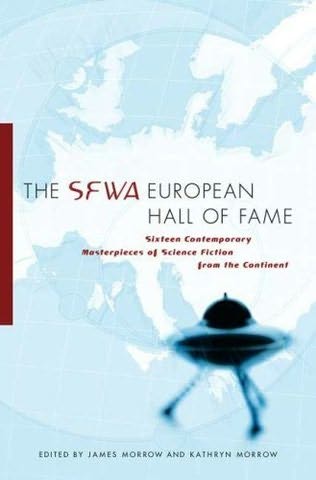Les chroniques de l'archiviste
Il y a un an James Morrow and Kathryn Morrow sortaient aux etats Unis une anthologie d'auteurs européens. Une anthologie avec notamment au sommaire JC Dunyach..
C'était The SFWA European Hall of Fame. Il est interview ce matin et il raconte que le projet est née aux Utopiales. Extraits :
SF Signal: Can you tell us about the genesis of The SFWA European Hall of Fame and how you came to co-edit it with your wife Kathryn?
James Morrow: Way back at the turn of the millennium, my French publisher encouraged Kathy and me to attend a new and innovative science fiction event, Utopiales, closer in spirit to the Cannes Film Festival than to an American SF convention. In the autumn of 2000, scores of writers, translators, editors, publishers, filmmakers, and fans from all over the world descended on Nantes. Over the course of several lunches and dinners with this extraordinary group of people, Kathy and I gradually became aware that the average non-Anglophone SF writer is caught in a Catch-22. He can't get translated into English unless he already has an English-speaking readership, and he can't acquire an English-speaking readership unless he's already translated into English.
Kathy and I looked at each other and said, "Maybe we can short-circuit this vicious cycle." So I wrote a proposal to SFWA, the Science Fiction and Fantasy Writers of America, and received a $1500 grant. This seed money was sufficient to finance a half-dozen professional translations, and these stories formed the nucleus of our pitch to prospective publishers.
Before turning the proposal over to our agent, Kathy and I made every story the object of intense editorial fussing. We always convened a protracted three-way Internet conversation among ourselves, the translator, and the original author. The idea was to polish each translation to a fare-thee-well, so it would read smoothly in English while still retaining the style, voice, nuances, quirks, and Je ne sais quoi of the original text.
SFS: Does translated science fiction get shortchanged in America?
JM: Worse than shortchanged. Pretty much ignored. The American publishing establishment is simply not set up to deal with other languages. The typical European editor is bilingual or trilingual and has at his or her fingertips contact information for a half-dozen translators, and it goes without saying that translations will figure in the budget. His or her American counterpart is much more parochial in this regard.
Of course, many American SF editors would love to publish stories and novels in translation -- I think especially of Gordon Van Gelder at F&SF and David Hartwell, who ended up acquiring The SFWA European Hall of Fame. But the money simply isn't there. A U.S. magazine editor will occasionally receive an English-language piece from abroad, but typically it will be an amateur translation or a self-translation, awkward in ways practically guaranteed to alienate the reader. If the editor were to publish such a story as it stood, everybody would likely lose -- author, editor, audience.
Toute l'interview est ici.

C'était The SFWA European Hall of Fame. Il est interview ce matin et il raconte que le projet est née aux Utopiales. Extraits :
SF Signal: Can you tell us about the genesis of The SFWA European Hall of Fame and how you came to co-edit it with your wife Kathryn?
James Morrow: Way back at the turn of the millennium, my French publisher encouraged Kathy and me to attend a new and innovative science fiction event, Utopiales, closer in spirit to the Cannes Film Festival than to an American SF convention. In the autumn of 2000, scores of writers, translators, editors, publishers, filmmakers, and fans from all over the world descended on Nantes. Over the course of several lunches and dinners with this extraordinary group of people, Kathy and I gradually became aware that the average non-Anglophone SF writer is caught in a Catch-22. He can't get translated into English unless he already has an English-speaking readership, and he can't acquire an English-speaking readership unless he's already translated into English.
Kathy and I looked at each other and said, "Maybe we can short-circuit this vicious cycle." So I wrote a proposal to SFWA, the Science Fiction and Fantasy Writers of America, and received a $1500 grant. This seed money was sufficient to finance a half-dozen professional translations, and these stories formed the nucleus of our pitch to prospective publishers.
Before turning the proposal over to our agent, Kathy and I made every story the object of intense editorial fussing. We always convened a protracted three-way Internet conversation among ourselves, the translator, and the original author. The idea was to polish each translation to a fare-thee-well, so it would read smoothly in English while still retaining the style, voice, nuances, quirks, and Je ne sais quoi of the original text.
SFS: Does translated science fiction get shortchanged in America?
JM: Worse than shortchanged. Pretty much ignored. The American publishing establishment is simply not set up to deal with other languages. The typical European editor is bilingual or trilingual and has at his or her fingertips contact information for a half-dozen translators, and it goes without saying that translations will figure in the budget. His or her American counterpart is much more parochial in this regard.
Of course, many American SF editors would love to publish stories and novels in translation -- I think especially of Gordon Van Gelder at F&SF and David Hartwell, who ended up acquiring The SFWA European Hall of Fame. But the money simply isn't there. A U.S. magazine editor will occasionally receive an English-language piece from abroad, but typically it will be an amateur translation or a self-translation, awkward in ways practically guaranteed to alienate the reader. If the editor were to publish such a story as it stood, everybody would likely lose -- author, editor, audience.
Toute l'interview est ici.

Qu'en pensez-vous ?
Authentification, Vous devez être connecté pour ajouter des commentaires.






